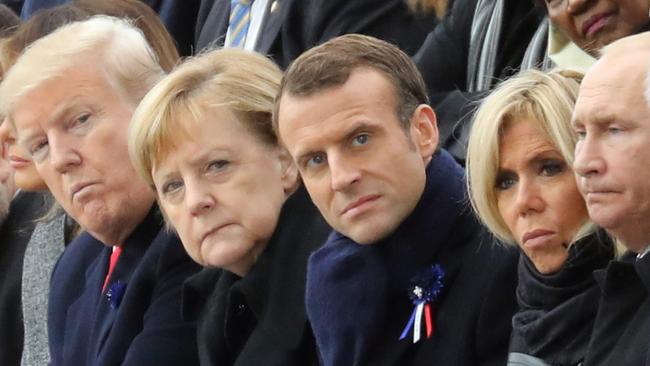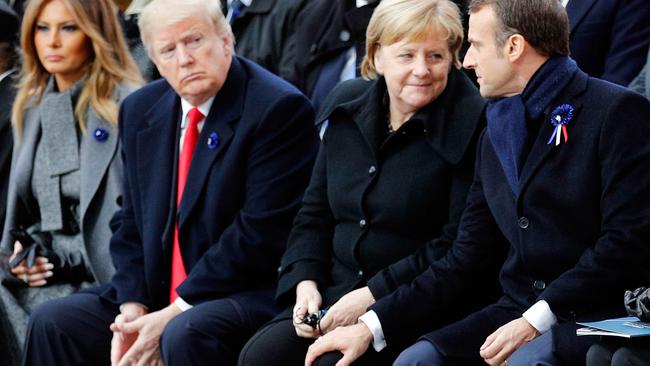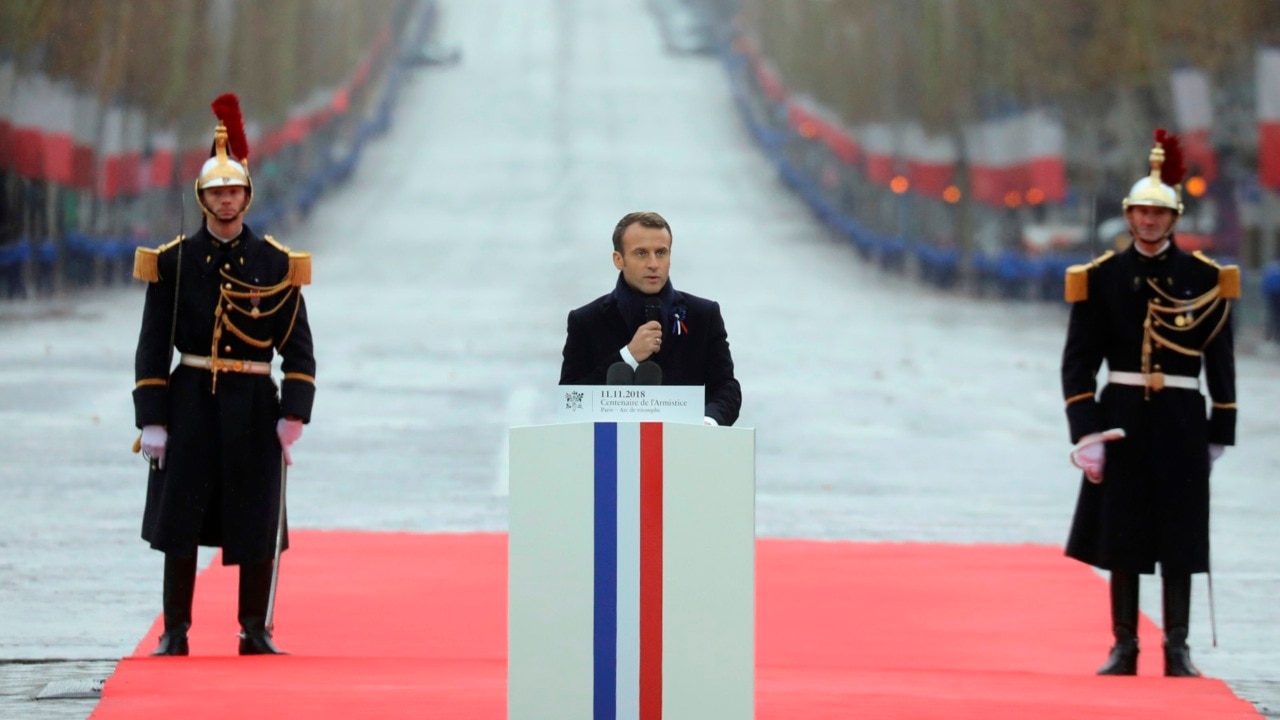Angela Merkel joins France’s call for European army as Donald Trump unleashes on Emanuel Macron
Angela Merkel joins France’s call for the creation of a European army as Donald Trump unleashes on Emanuel Macron.

German chancellor Angela Merkel has risked further ire from United States president Donald Trump over the future of the North Atlantic Treaty Organisation (NATO) following an impassioned call for an integrated European Union military force.
Her comments overnight to the European Parliament came as Mr Trump lashed French President Emmanuel Macron on Twitter over his suggestion last week for a European defence force, as well attacking French tariffs on US wine and Mr Macron’s approval ratings.
The litany of tweeted complaints served to underscore tensions between the once-chummy leaders and laid bare Mr Trump’s irritation over criticism stemming from his latest trip abroad.
Mrs Merkel said: “What is really important, if we look at the developments of the past year, is that we have to work on a vision of one day creating a real, true European army.’’
To a mixed reception of boos from nationalists and enthusiastic applause from others, Mrs Merkel said such armed forces would not undermine the US-led military alliance NATO but could be complementary to it. She referenced the European Commission president Jean-Claude Juncker who has been promoting a European army concept for four years, insisting this would show the world there would never again be war in Europe. “This is not an army against NATO, it can be a good complement to NATO,” she said.
Mrs Merkel appeared to criticise the United States, in particular Mr Trump’s withdrawal of the United States from the nuclear treaty in her remarks.
“The time when we could rely on others is over,” Mrs Merkel said.
“Europe must take our fate into our own hands if we want to protect our community.
“I will propose the establishment of a European Security Council with a rotating presidency.”

Mr Macron had made similar pronouncements last week before the Armistice Day commemorations. On Europe 1 television he said: “I believe in the project of a sovereign Europe. We won’t protect Europe if we don’t decide to have a true European army.
“We have to have a Europe that can defend itself alone — and without only relying on the United States in a more sovereign manner.
“We should protect ourselves when it comes to China, Russia and even the United States of America.’’
French government officials later clarified the remark insisting Mr Macron was referring to US decisions, not any kind of military aggression.
Last week Mr Trump criticised that French position saying: “President Macron of France has just suggested that Europe build its own military in order to protect itself from the US, China and Russia.
“Very insulting, but perhaps Europe should first pay its fair share of NATO, which the US subsidises greatly!’’
This morning Mr Trump repeated his fury about the funding of NATO, even before Mrs Merkel made her speech.
The US President lashed out at his French counterpart over military spending and trade, two days after returning from a trip to Paris that exposed the underlying tensions between the leaders.
In a series of tweets, Mr Trump criticised Mr Macron over his struggle to overhaul France’s economy, castigated Mr Macron’s suggestion that Europe needs to be more self-sufficient in its own defence and called for France to contribute more to NATO.
“Emmanuel Macron suggests building its own army to protect Europe against the U.S., China and Russia. But it was Germany in World Wars One & Two - How did that work out for France?” Mr. Trump wrote.
“They were starting to learn German in Paris before the U.S. came along. Pay for NATO or not!”
Emmanuel Macron suggests building its own army to protect Europe against the U.S., China and Russia. But it was Germany in World Wars One & Two - How did that work out for France? They were starting to learn German in Paris before the U.S. came along. Pay for NATO or not!
— Donald J. Trump (@realDonaldTrump) November 13, 2018
Mr Macron’s office declined to comment on the Twitter posts.
Mr Trump’s Twitter outburst came on the heels of his trip to Paris to mark the 100th anniversary of the World War I armistice. At a commemoration ceremony at the foot of the Arc de Triomphe, Mr Macron delivered a pointed warning against the dangers of rising nationalism.
With Mr Trump looking on, the French leader denounced nationalism as countries acting in their self-interest and a “betrayal” of patriotism. Mr Trump, in an October campaign rally, asserted: “I’m a nationalist.” Mr Macron also defended multilateral institutions like the United Nations and the European Union, as well as the world order underpinned by international cooperation that emerged in the wake of two world wars.
That system has been put to the test by Mr Trump and his “America first” agenda as well as by the rise of authoritarian leaders such as President Vladimir Putin of Russia and President Recep Tayyip Erdo an of Turkey — all of whom were present for the ceremony.
Mr Trump’s broadsides against the French president signal the further deterioration of their relationship, which blossomed in a July 2017 visit by the president to Paris.
On Tuesday, Mr Trump criticised France for making it “very hard for the U.S. to sell its wines into France,” saying, “France makes excellent wine, but so does the U.S.”
“Not fair, must change!” the president wrote.
On Trade, France makes excellent wine, but so does the U.S. The problem is that France makes it very hard for the U.S. to sell its wines into France, and charges big Tariffs, whereas the U.S. makes it easy for French wines, and charges very small Tariffs. Not fair, must change!
— Donald J. Trump (@realDonaldTrump) November 13, 2018
According to the Wine Institute, a US trade body, EU import tariffs on a bottle of wine run between 11 cents and 29 cents depending on alcohol content, while U.S. import tariffs are 5 cents for still wine and 14 cents for sparkling.
Mr Trump also took aim at Mr Macron’s approval rating and French unemployment. “The problem is that Emmanuel suffers from a very low Approval Rating in France, 26%, and an unemployment rate of almost 10%. He was just trying to get onto another subject,” Mr Trump wrote. “By the way, there is no country more Nationalist than France, very proud people -- and rightfully so!” He added: “MAKE FRANCE GREAT AGAIN!”
The problem is that Emmanuel suffers from a very low Approval Rating in France, 26%, and an unemployment rate of almost 10%. He was just trying to get onto another subject. By the way, there is no country more Nationalist than France, very proud people-and rightfully so!........
— Donald J. Trump (@realDonaldTrump) November 13, 2018
......MAKE FRANCE GREAT AGAIN!
— Donald J. Trump (@realDonaldTrump) November 13, 2018
A poll conducted by Kantar Sofres found Mr Macron’s approval rating at 26 per cent at the end of last month. The unemployment rate in France stood at 9.1 per cent in the second quarter of the year.
Mr Macron is in the middle of a contentious drive to overhaul France’s economy and make it more business friendly. His approval ratings have tumbled from 44 per cent at the start of the year, according to Kantar Sofres. His fledgling centrist party Republic on the Move maintains a strong majority in parliament, but the French president has been shedding prominent supporters on the left, due in part to his pro-business agenda.
Mr Trump has frequently demanded more military spending from European members of NATO and questioned the alliance’s benefits for the U.S.
The two leaders then held a tense meeting Saturday inside the Élysée Palace. Speaking to reporters before going into the meeting, Mr Macron sought to thaw tensions over trans-Atlantic security ties, agreeing with Mr Trump that Europe needed to share more of the burden for defending the continent.
“When President Trump has to protect or to defend one of the states of the United States, he doesn’t ask France or Germany, or another government of Europe to finance it,” Mr Macron said before heading into the closed door meeting with Mr Trump. “That’s why I do believe that we need more investment.”
With Wall Street Journal
More Coverage





